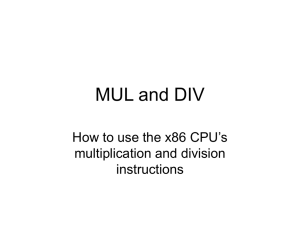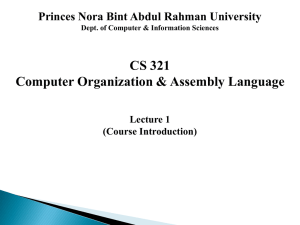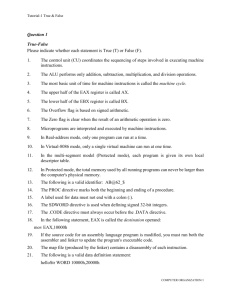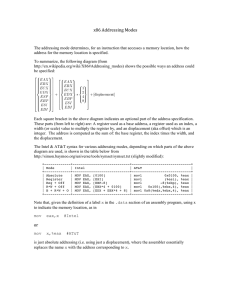64-bit NASM Notes
advertisement
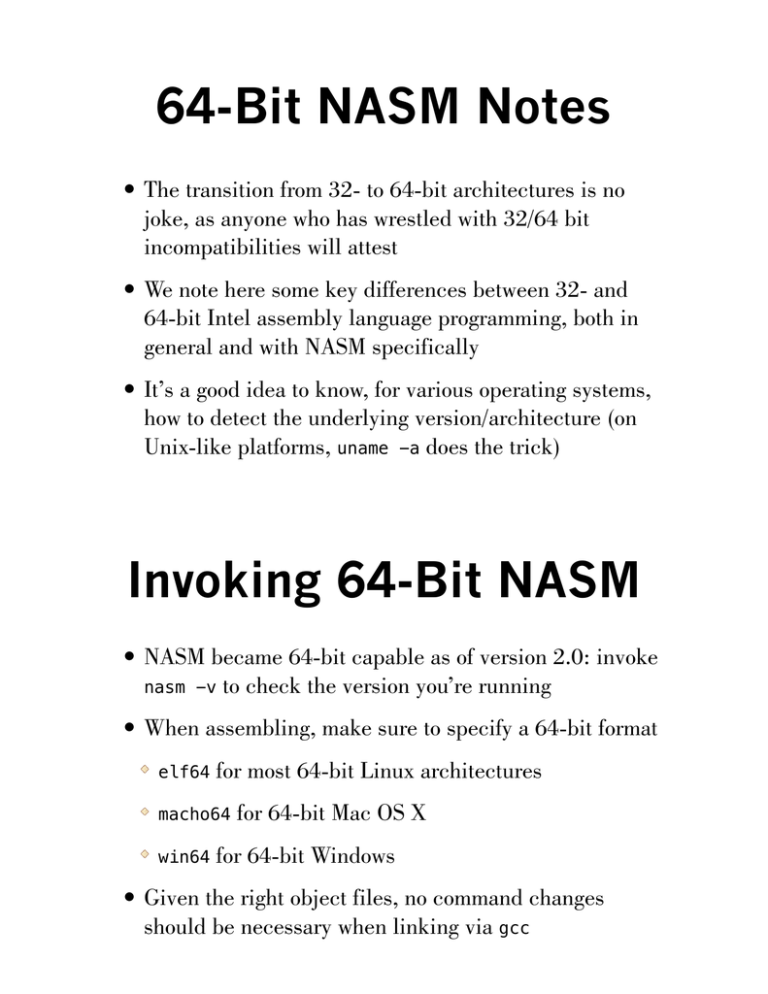
64-Bit NASM Notes
• The transition from 32- to 64-bit architectures is no
joke, as anyone who has wrestled with 32/64 bit
incompatibilities will attest
• We note here some key differences between 32- and
64-bit Intel assembly language programming, both in
general and with NASM specifically
• It’s a good idea to know, for various operating systems,
how to detect the underlying version/architecture (on
Unix-like platforms, uname -a does the trick)
Invoking 64-Bit NASM
• NASM became 64-bit capable as of version 2.0: invoke
nasm -v
to check the version you’re running
• When assembling, make sure to specify a 64-bit format
elf64
for most 64-bit Linux architectures
macho64
win64
for 64-bit Mac OS X
for 64-bit Windows
• Given the right object files, no command changes
should be necessary when linking via gcc
Registers
• The primary new capability in 64-bit architectures is
the ability to operate on a quadword’s worth of data in
a single instruction
• Addressable memory, both virtual and physical,
becomes larger by virtue of 64-bit pointers/addresses
• Structurally, most registers are larger (64 bits wide,
duh), and there are more of them (16 general-purpose
registers vs. 8 in 32-bit Intel CPUs)
• Registers eax, ebx, ecx, edx, ebp, esp, esi, and edi are
now 64-bit: rax, rbx, rcx, rdx, rbp, rsp, rsi, rdi
• The new general-purpose registers are r8, r9, r10, r11,
r12, r13, r14,
and r15 — these are also available in
32-bit flavors r8d–r15d
• Most of the time, operands that are smaller than 64 bits
zero-extend to 64 bits
• The default operand size is 32 bits — except when
pushing/popping the stack: that’s 64- or 16-bit only
• When in doubt, consult Chapter 3 of the Intel 64 and
IA-32 Architectures Software Developer’s Manual,
Volume 1
Calling Conventions
• Calling conventions are platform-specific, each with
official documentation — typically called the
application binary interface (ABI)
• For Linux, Windows, and Mac OS X respectively, the
specifications can be found at:
http://www.x86-64.org/documentation/abi.pdf
http://msdn2.microsoft.com/en-gb/library/ms794533.aspx
http://developer.apple.com/Mac/library/documentation/
DeveloperTools/Conceptual/LowLevelABI
Some calling convention highlights on 64-bit Linux:
• Integer/pointer parameters are placed, in order, in rdi,
rsi, rdx, rcx, r8,
and r9
• Floating-point arguments go to the xmm registers
• Variable-argument subroutines require a value in rax
for the number of vector registers used
• Registers rbp, rbx, and r12 through r15 are “caller-
owned” — the called function must preserve them
(either don’t touch them, or save-and-restore via the
stack or other mechanism)
• Integer/pointer return values are placed in rax or
possibly rdx; floating point goes in xmm0 or xmm1
64-Bit Examples
• The following listings include direct conversions of
some of the 32-bit examples in Prof. Toal’s x86assembly
and nasmexamples pages to 64-bit Linux
• Note how, aside from calling conventions and selected
conversion to 64-bit registers, not much has actually
changed — i.e., the main concepts of good assembly
language programming remain the same
• Conversion to other 64-bit Intel operating systems is
left as an interesting and beneficial exercise :)
Of course, we start with helloworld…
global
_start
section .text
_start:
message:
; write(1, message, 13)
mov
eax, 4
mov
ebx, 1
mov
ecx, message
mov
edx, 13
int
80h
;
;
;
;
; exit(0)
mov
eax, 1
mov
ebx, 0
int
80h
; system call 1 is exit
; we want return code 0
db
system call 4 is write
file handle 1 is stdout
address of string to output
number of bytes
No changes here, since
we use interrupts instead
of subroutines!
"Hello, World", 10
global
extern
The version that uses
printf is another story:
compare this to the
32-bit version…
main
printf
section .text
main:
message:
mov
rdi, message
; rdi gets the first argument (a pointer)
xor
rax, rax
call
ret
printf
; printf has a variable number of arguments,
; so rax needs to be set to the number of
; vector registers used...zero in this case
db
'Hello, World', 10, 0
needs a similar makeover since it also uses
printf — note the use of the stack for register preservation
powers.asm
extern
global
printf
main
section .data
format:
db
'%d', 10, 0
section .text
main:
L1:
mov
mov
esi, 1
edi, 31
; current value
; counter
push
push
rsi
rdi
; save registers
mov
rdi, format
; address of format string
; second argument, the current number, is already in rsi
xor
call
eax, eax
printf
; zero vector registers (eax is OK)
pop
pop
rdi
rsi
; restore registers
add
dec
jne
esi, esi
edi
L1
; double value
; keep counting
ret
global
extern
main
printf
section .text
main:
push
rbx
; we have to save this since we use it
; 32-bit operands will zero-extend to 64 bits
mov
xor
xor
inc
print:
ecx, 40
eax, eax
ebx, ebx
ebx
ecx
eax
ebx
ebx
will countdown from 40 to 0
will hold the current number
will hold the next number
is originally 1
; We need to call printf, but we are using eax, ebx, and ecx.
; printf may destroy eax and ecx so we will save these before
; the call and restore them afterwards.
push
push
rax
rcx
; 32-bit stack operands are not encodable
; in 64-bit mode, so we use the "r" names
mov
mov
xor
call
rdi, format
rsi, rax
eax, eax
printf
; arg 1 is a pointer
; arg 2 is the current number
; no vector registers in use
pop
pop
rcx
rax
mov
mov
add
dec
jnz
edx, eax
eax, ebx
ebx, edx
ecx
print
;
;
;
;
;
pop
rbx
; restore ebx before returning
ret
format:
;
;
;
;
db
'%10d', 10, 0
save the current number
next number is now current
get the new next number
count down
if not done counting, do some more
64-bit fib.asm
must preserve
the caller-owned
rbx register
maxofthree
global
in 32- and 64-bit incarnations…
maxofthree
global
section .text
maxofthree:
mov
mov
mov
cmp
cmovl
cmp
cmovl
ret
eax,
ecx,
edx,
eax,
eax,
eax,
eax,
maxofthree
section .text
maxofthree:
cmp
cmovl
cmp
cmovl
mov
ret
[esp + 4]
[esp + 8]
[esp + 12]
ecx
ecx
edx
edx
edi,
edi,
edi,
edi,
eax,
esi
esi
edx
edx
edi
;
;
;
;
;
compare args 1 and 2
set edi to the larger
compare against arg 3
set edi to the larger
return value in rax
(note how we can use the
operands right away; return
value remains expected in eax)
#include <stdio.h>
int maxofthree(int, int, int);
…both work with the
same C source (why?).
int main() {
printf("%d\n",
printf("%d\n",
printf("%d\n",
printf("%d\n",
printf("%d\n",
printf("%d\n",
return 0;
}
maxofthree(1, -4, -7));
maxofthree(2, -6, 1));
maxofthree(2, 3, 1));
maxofthree(-2, 4, 3));
maxofthree(2, -6, 5));
maxofthree(2, 4, 6));
64-bit does not change how main is still “just a function”
— but accordingly, command line arguments need to be
processed using the new ABI, as seen in 64-bit echo.asm
global
extern
main
printf
section .text
main:
top:
mov
mov
rcx, rdi
rdx, rsi
; argc
; argv
push
push
rcx
rdx
; save registers that printf wastes
mov
mov
xor
call
rdi, format
rsi, [rdx]
rax, rax
printf
; the format string
; the argument string to display
; zero vector registers
pop
pop
rdx
rcx
; restore registers printf used
add
dec
jnz
rdx, 8
rcx
top
; point to next argument
; count down
; if not done counting keep going
ret
format:
db
'%s', 10, 0
